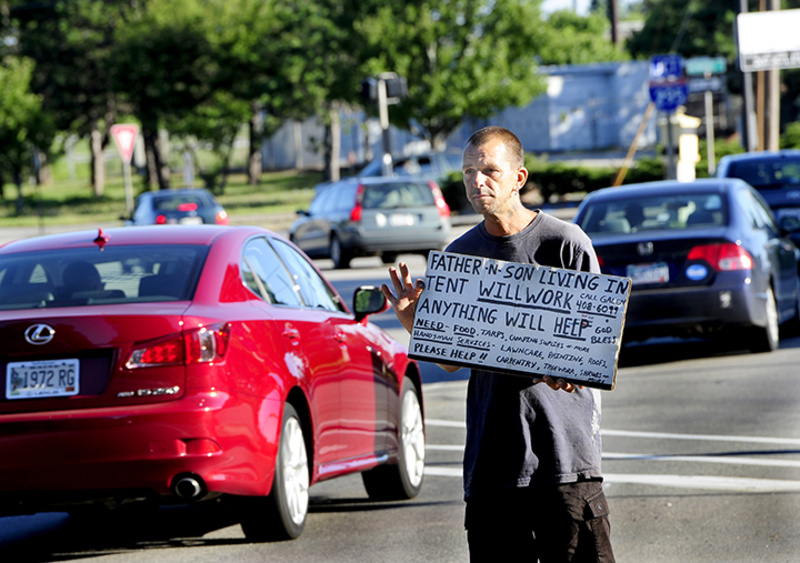PORTLAND – Portland is making measurable progress on its effort to bolster support systems for the chronically homeless and place them more quickly in permanent housing, Mayor Michael Brennan said Thursday.
The announcement came on the same day that Portland police began enforcing a new rule barring panhandlers from traffic medians — a coincidence of scheduling, according to city spokeswoman Nicole Clegg.
So far no citations have been issued for violating the day-old ban.
Although hundreds of people still depend on shelters nightly, city officials said they have secured 40 Section 8 housing vouchers to place people in permanent homes, and received $355,000 in additional state funding to administer programs through more persistent case management and rapid rehousing.
About half of the Section 8 vouchers are in the hands of the organizations that will administer them. The city expects to distribute the rest before the end of the year.
“This is an unprecedented effort,” Brennan said.
The announcement followed implementation of recommendations taken from a study completed in 2012. The report highlighted seven areas of improvement for service providers who interact with the city’s neediest. The measures included: increased availability of caseworkers; extended outreach programs to help identify people in need of service; easing barriers to the construction of new affordable housing; and rehousing the newly homeless more quickly.
Jon Bradley, associate director at the Preble Street Resource Center, said that for the first time in recent memory, month-over-month use of the shelter has declined. This July, 286 individuals slept in the shelter per night, down from 304 per night last July, he said.
“The fact that we went down is really amazing,” Bradley said. “We’ve changed the trajectory.”
In April, the city also tightened its shelter use policy, telling people they could no longer stay at the city’s shelters indefinitely unless they also agreed to work with a caseworker to find permanent housing.
The city instituted the policy after record numbers of homeless sought beds at the Oxford Street and Florence House shelters. The policy was met with mixed reaction from some of the homeless population, who said the policy could force more people onto the street.
Homelessness is a complex problem with convoluted root causes, including lack of employment or under-employment, the high cost and low availability of preventive health care and mental health services, and drug and alcohol abuse, Bradley said.
The increasingly tight housing market in Portland, where vacancy rates hover below 5 percent, also make it difficult to find apartments where vouchers are accepted.
Still, housing remains the single most important factor to improve lives, Bradley said. And without substantial increases in federal funding, it will be nearly impossible to end homelessness.
“You can’t get better on the street,” Bradley said.
Jennifer Vann, 41, understands that well. Vann, originally from Bangor, was homeless for nearly a year and said she is on disability because of severe obsessive compulsive disorder and post-traumatic stress disorder. After working with a caseworker, she was finally able to receive housing through one of the 40 vouchers.
“The waiting list in Bangor is two, three years,” she said. “There isn’t enough funding.”
Outside Preble Street Resource Center Thursday afternoon, reaction to the city’s news conference lauding its efforts was mixed.
One 27-year-old homeless woman, who declined to give her name for fear of retaliation from center staff, said she opts to find housing on her own, rather than submit to the city’s requirements and play a seemingly endless waiting game. Many people in the shelter have no business in regular housing, she said, and need specialized mental-health care or rehabilitation.
“Waiting for them to help you is like waiting for rain in a . . . drought,” she said.
Matt Byrne can be reached at 791-6303, or at:
mbyrne@pressherald.com
Send questions/comments to the editors.



